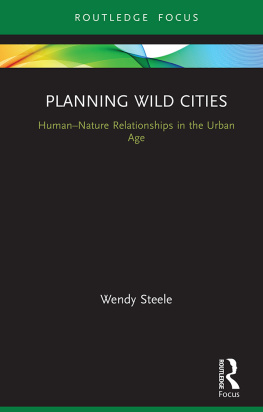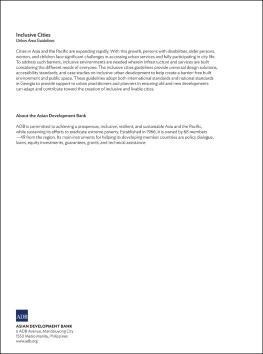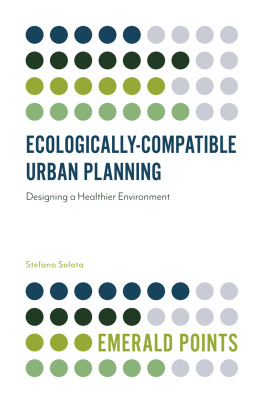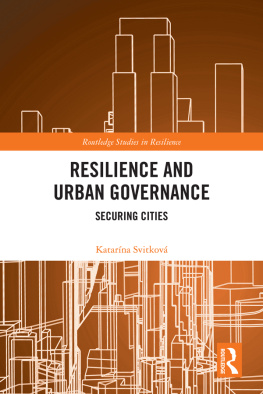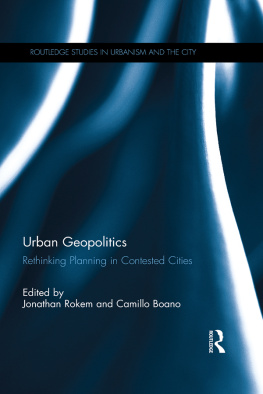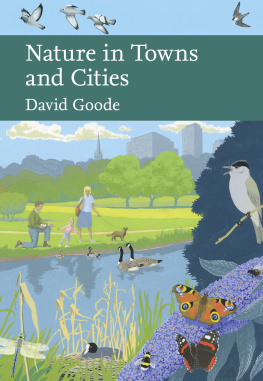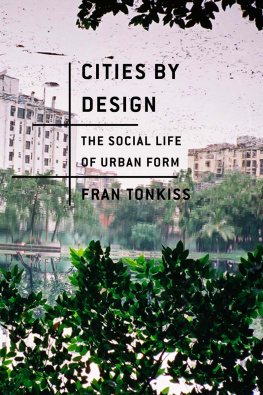CITIES, NATURE AND DEVELOPMENT
Sarah Dooling: To my parents and Marion
Gregory Simon: To Dimitri and Gabriel
Cities, Nature and Development
The Politics and Production of Urban Vulnerabilities
Edited by
SARAH DOOLING
University of Texas Austin, USA
and
GREGORY SIMON
University of Colorado Denver, USA
First published 2012 by Ashgate Publishing
Published 2016 by Routledge
2 Park Square, Milton Park, Abingdon, Oxon OX14 4RN
711 Third Avenue, New York, NY 10017, USA
Routledge is an imprint of the Taylor & Francis Group, an informa business
Copyright 2012 Sarah Dooling and Gregory Simon
All rights reserved. No part of this book may be reprinted or reproduced or utilised in any form or by any electronic, mechanical, or other means, now known or hereafter invented, including photocopying and recording, or in any information storage or retrieval system, without permission in writing from the publishers.
Sarah Dooling and Gregory Simon have asserted their right under the Copyright, Designs and Patents Act, 1988, to be identified as the editors of this work.
Notice:
Product or corporate names may be trademarks or registered trademarks, and are used only for identification and explanation without intent to infringe.
British Library Cataloguing in Publication Data
Cities, nature and development : the politics and production of urban vulnerabilities.
1. Urban ecology (Sociology) 2. Sustainable development.
I. Dooling, Sarah. II. Simon, Gregory.
307.76-dc22
Library of Congress Cataloging-in-Publication Data
Cities, nature and development : the politics and production of urban vulnerabilities / by Sarah Dooling and Gregory Simon, [editors].
p. cm.
Includes bibliographical references and index.
ISBN 9781409408314 (hardback) -- ISBN 9781409408321 (ebook)
1. Urban ecology (Sociology) 2. Political ecology. 3. Environmental policy. 4. Nature--Effect of human beings on. I. Dooling, Sarah. II. Simon, Gregory, 1974
HT241.C57 2011
307.76--dc23
2011021384
ISBN: 9781409408314 (hbk)
ISBN: 9781315572123 (ebk)
Contents
Sarah Dooling and Gregory Simon
Gregory Simon
Timothy W. Collins and Anthony M. Jimenez
Harold A. Perkins
Julian Agyeman and Benjamin L. Simons
Sarah Dooling
Kelvin Mason and Mark Whitehead
Alec Brownlow
Jessica K. Graybill
Eliot M. Tretter and Melissa Adams
List of Figures
List of Tables
Acknowledgments
Sarah Dooling: many thanks to Elizabeth Mueller, University of Texas colleague and friend, for our work and discussions on equity and vulnerability. Thanks to my 2010 Urban Ecology seminar, where these ideas were discussed, challenged and refined. And lastly, thanks to Nishtha Meta, doctoral student, whose work has also been a springboard for developing these concepts.
Gregory Simon: I am grateful to members of the Lane Center and Spatial History Lab at Stanford University during various stages of this research, including Peter Alagona, Mathew Booker and Bob Wilson; and also Richard White for his guidance. A number of colleagues at CU Denver have provided immense support including Brian Page and Deb Thomas who so graciously shared her considerable insights on theories of vulnerability. For their thought provoking insights, I would like to thank members of the 2010 AAG panel Conservation, Development and the Production of Urban Vulnerabilities and the 2009 ACSP roundtable People, Nature and Cities: New Directions for Urban Ecology in the 21st Century. Many friends and family have taken important supportive roles including Jesse Grant, Maria and Jeff Simon and the Helena Simon family. Thanks to Vicky for teaching me the meaning of hard work. And to Dimitri and Gabriel, you bring constant joy and inspiration to all my endeavors.
List of Contributors
Melissa Adams received her BA in Urban Studies from the University of Texas at Austin in 2009. She is currently a bilingual elementary school teacher in Austin. Her research interests center around bilingual mathematics education methods, race theory, particularly in terms of access to education.
Julian Agyeman is Professor and Chair of Urban and Environmental Policy and Planning at Tufts University. His research interests critically explore aspects of the complex and embedded relations between humans and the environment, whether mediated by institutions or social movement organizations, and the effects of this on public policy and planning processes and outcomes, particularly in relation to notions of justice and equity.
Timothy W. Collins is an Associate Professor of Geography in the Department of Sociology and Anthropology at the University of Texas at El Paso. He received his Ph.D. in Geography (2005) with a concentration in Urban Ecology from Arizona State University, where he was also a postdoctoral researcher (20052006) studying water resource conflict with the Decision Center for a Desert City. His research focuses on risks, hazards, disasters and urban environmental governance, and emphasizes issues of social vulnerability and environmental injustice in particular.
Sarah Dooling is Assistant Professor or Urban Ecology at the University of Texas in the School of Architecture and the Environmental Science Institute. Her research interests investigate the intersections between ecology and poverty, and ecology and violence.
Jessica K. Graybill is an Assistant Professor in the Geography Department at Colgate University. She holds a Ph.D. in Geography from the University of Washington with a concentration in Urban Ecology. Her ongoing research in the Russian Far East and in a variety of US urban settings focuses on human experiences with the environment, utilizing cognitive mapping and ethnographic field research techniques to elicit how people perceive and then use surrounding built and natural environments. Jessica works closely with indigenous and local peoples, as well as other stakeholders in government and corporate realms to present the kaleidoscope of meanings attributed to environmental use.
Anthony M. Jimenez is a Graduate Student and Teaching Assistant in the Department of Sociology and Anthropology, University of Texas at El Paso. He is in the process of earning his MA with foci in gender and international development. His current research investigates the underlying power dynamics within international development programs, specifically the role of gender ideologies. Additional research interests include neoliberalism, transnationalism, and globalization.
Kelvin Mason is a Senior Lecturer in the Graduate School of the Environment at the Centre for Alternative Technology in Machynlleth, Wales. With a Ph.D. in Human Geography, an MCs in Environmental Management and a first degree in Mechanical Engineering, his research interests range from social movements to building materials, coalescing around participation.



